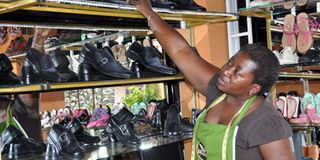Buyinza wants to become top shoe manufacturer

Ms Veronica Buyinza displays some shoes made at her factory in Wandegeya last week. Photo by Eronie Kamukama
What you need to know:
From her first sale that brought in Shs55,000, Ms Buyinza’s shoe business is now worth Shs15m. She tells Eronie Kamukama how she hopes to compete with top shoe makers like Bata.
The path that leads to Venabu Investments Ltd in Wandegeya narrows as one gets closer to the company’s office. But it is just because Ms Veronica Buyinza is nurturing a small paradise at her mini-factory.
From the monster plant to geraniums, to impatiens, to English ivy, to spider plant and Bagonia, the colours, the surrounding breeze and life that flows through the various flower species outside her office leaves you feeling calm.
“It feels very homely here, I do not feel like am at work, Ms Buyinza says. She has had an attachment to flowers since the age of three when she discovered her mother’s garden. This attachment has since turned into a landscaping business for households around central Uganda.
But landscaping is not her only passion. When I meet the mother of seven, she is making sleeves to be fixed to a pupil’s uniform.
Sticking to family skill
Earlier in her life, she thought she would become a nurse but life turned her into a seamstress.
“My parents were tailors. I loved tailoring because it kept the whole home on its feet as we did the threading, ironing and packaging. Also, I love the idea of seeing fabric transformed from scratch to something one can wear,” the 45-year-old says. Besides just a household routine, she realised she could grow a business empire from the skill her family had survived on.
Four years after she terminated her high school education following the birth of her first son, Ms Buyinza used her income earned from making small envelopes to invest in tailoring.
Along the way, she did other businesses such as bridal services and distribution of drinks until price fluctuations and conmen forced her out of the business in late 2014.
“I had to find something where I could decide my own prices,” she says.
“I was also conned of Shs36m in distribution and it gave me a very big setback.”
Dusting off losses
Ms Buyinza only picked up after four months of frustration. This time, she says, she would do something associated with tailoring.
Investing in shoes
The risk taker who knows determination says, “I either bang my head on the pole or go through it. I went into shoemaking because shoes are tailored. But I also had to go for leather because it was something new,” she says.
While she had lost millions, she sold off a distribution truck and remaining stock to accumulate Shs8m that she used as startup capital for what she now brands Vena shoes.
“From the Shs8m, I had to pay taxes filed but no paid worth Shs5m so I remained with Shs3m,” she recalls.
Her next task was buying a strong tailoring machine for shoes and this she got at Shs1.2m. The rest bought her first leather. Stitching shoes differs from stitching a dress.
So she hired her first two fresh graduates from vocational school, a move that introduced her to the shoe industry challenges.
“They were learning from my material but as a creator of things, the finishing of the shoes indicated they were quality issues,” she narrates. The poor quality of Ugandan leather and counterfeit glue did not make things any easier.
Market
The shoemaker, now in her third year says penetrating the market has been a big hurdle.
“Making a customer understand that Ugandan products are good has been difficult,” she admits.
Her family formed her first clientele and she has since turned around uptake of the shoes using quality control, trade exhibitions and online shopping platforms.
From five pairs a day in 2015, Venabu is producing 15 to 20 pairs of shoes a day but this is not anywhere close to her dream ambition to make 100 pairs of shoes a day.
She blames the lack of advanced machinery.
“It costs a lot of money. We have had many youth who want to join us but we cannot because the little we have is not enough,” she says.
Sometimes orders surpass production capacity and she turns to her children for finances. She would need Shs200m to have the right machinery and other materials like soles.
“We only have soles from Nairobi, the ones made here are plastic. Soles for classy gentleman and lady shoes have to be imported from Italy, Ethiopia and we cannot afford it,” she explains.
Materials
For now, her workers are using stoves to heat soles, tailoring machines for stitching and manual lasting methods to make school shoes and men’s shoes. From her first sale that brought in Shs55,000, Ms Buyinza says her shoe business is worth Shs15m.
“The peak season is first term for pupils where I can make sales between Shs8m and Shs10m.”
Bata is her competitor
She makes office wear but not every gentleman wants to wear rubber shoes.
“I would love to be at the top of the Ugandan market like when you talk about Bata. It is a virgin market so the sky is the limit,” she says.
But first, Ugandans need to support the local shoe industry, she appeals.




